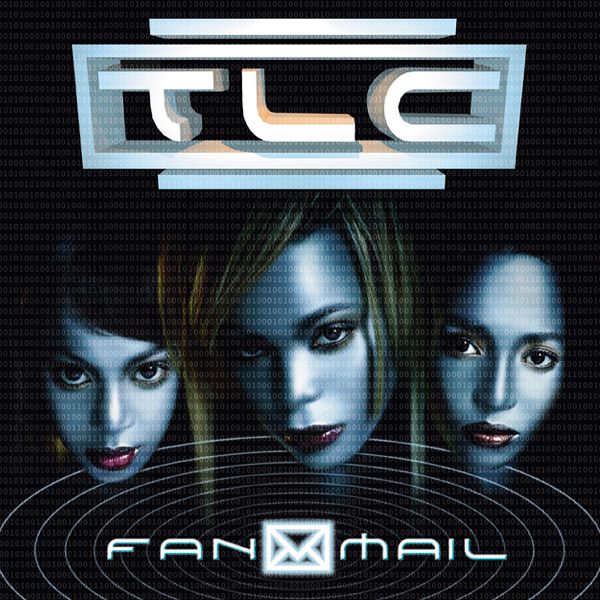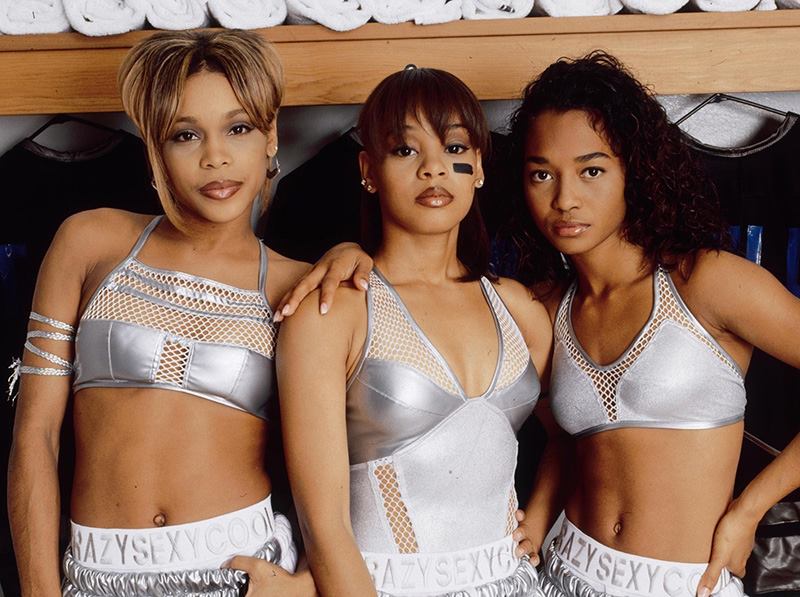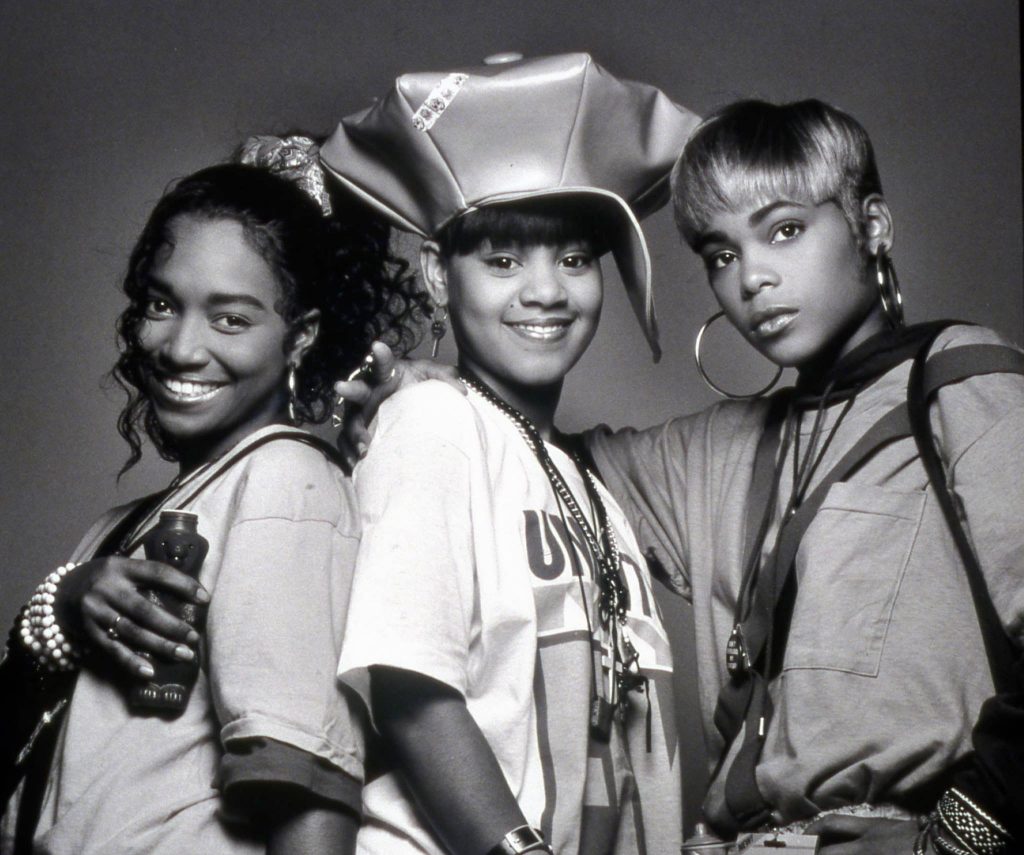TLC’s ‘FanMail’ Was A Devastating Message From A Lonely Future
TLC set the standard for contemporary R&B, but it’s their ubiquitous homilies of loneliness, self-love, and celebration that keeps their music alive.

Pop culture in 1999 hinged on the world’s fascination with the impending millennium. The threat of the Y2K apocalypse collided with the newly minted information superhighway, resulting in the techno-utopianism that encapsulated fashion, hardware design, music, and film.
The burgeoning technological trend in music went anywhere from inserting the gaudy sounds of dial-up modems, cell phones, and “you’ve got mail” pings into tracks, to pre-Google Glass fashion.
FanMail, TLC’s long-awaited follow-up to their record-breaking album, Crazy Sexy Cool, was one of the very first pop records to aestheticise the internet. Released at the beginning of 1999, the record’s tech trimmings were indicative of the era — from their bionic disembodied heads on the cover, to recurring ad-libs and a guest verse on ‘Silly Ho’ from talking android, Vic-E.
Frankly, most iterations of the Y2K/pop phenomenon haven’t aged particularly well. *NSYNC’s ‘Digital Get Down’ employs ostentatious talkbox vocals and confuses the concept of Skype sex with a phone call: “I can’t wait to get you on the phone girl/So, pick it up, babe/I can see everything you do.”
Britney Spears’ deep album cut, ‘Email My Heart’ awkwardly jams in dated references to unrequited “letters”: “I can see you in my mind/Coming on the line/And opening this letter/That I’ve sent a hundred times”. Online culture wasn’t that new in 1999, yet most lyrics made a mess of simple terminology.
While FanMail wasn’t immune to these pitfalls, its substance and overarching messages are strikingly timeless in a time of kitschy, and clumsy references to the worldwide web.

Journey To The Future
Title track and opener ‘FanMail’ begins with whirring digital accents and the computerised voice of Vic-E: “Welcome, we have dedicated our entire album to any person who ever sent us fanmail.” The esoteric fourth-member predicates that “This is a journey into life/Love, and the future of music.”
Vic-E wasn’t wrong. Half ode to fans, half a plea for connection, the gloomy and prophetic ‘FanMail’ details the disconnection and loneliness of fame in relation to the unchartered territories of the internet. The trio sing in unison “Just like you, we get lonely.”
T-Boz’s opening verse, a plea to a friend or a lover — “Waited for you for so long/Too many days since January I’m still sittin’/Miss alone/We shoulda did this already” — can mistakenly mirror *NSYNC cybersex anthem, but in context ‘FanMail’ is tackling the beginnings of a force majeure.
In fact, ‘FanMail’ was one of the first songs to explore the decidedly millennial problem of unprecedented connection to the world yet somehow being consumed by loneliness.
‘FanMail’ was one of the first songs to explore the decidedly millennial problem of unprecedented connection to the world yet somehow becoming the loneliest generation.
In 2010, Drake covered TLC’s melancholy opener with ‘I Get Lonely Too’. “You could be lonely with a bunch of people around you,” he told MTV News in an interview that year. “When [friends] call home to check on their girl or they say, ‘I’m not going to go out tonight. I’m just going to spend the night with my girl.’ That hits me, man. I just don’t have that.”
The Canadian rapper’s omnipresent struggle comes up again in the confessional ‘Marvin’s Room’ (“I’ve had sex four times this week, I’ll explain/Having a hard time adjusting to fame”), party anthem ‘HYFR’ and on his latest album Scorpion with the diaristic ‘Is There More’.
Drake tends to bemoan all his superficial connections: “Is there more to life than all of these corporate ties/And all of these fortunate times/And all of these asses that never come in proportionate size? Am I missin’ somethin’ that’s more important to find?” An unshakeable sense of longing permeates his entire discography, a search for something “real” that he’s spent a decade trying find.
In ‘Fanmail’, T-Boz and Chilli coo softly, longing for a tangible reality: “Every day I think I’m gonna meet ya/Can’t wait ’till the day I see ya.”
Living a life beholden to so many people is nothing if not trapping. The late Mac Miller longed for simpler days on ‘2009’, detailing the demons that swallowed him alive: “Isn’t it funny? We can make a lot of money/Buy a lot of things just to feel a lot of ugly.” On ‘Famous’ featuring his daughter, Reginae Carter, Lil Wayne grapples with the life he’s lead publicly: “I’m never alone/I got my demons.”

Followers, Not Friends
The democratisation of fame birthed virality. No longer a spectacle but a science, ‘going viral’ is as much as a tried and tested ascent into fame for anyone who wants it. From Youtube sensations like Justin Bieber and Alessia Cara, Twitter-built stars like Doja Cat to the countless influencers of Instagram, their loneliness is palpable. ‘I Have 2 Million Followers But No Friends’ reads a headline from the New York Post, but as shocking as it’s meant to be, none of it is remotely surprising.
“Everyone feels like they know me because they follow the news,” Left Eye once said in an interview. “And they don’t have a clue as to who I am.” The disconnect that TLC emanates in FanMail has trickled into the lives of everyone on social media. Being inundated with emails, DMs, and texts is an illusion that fails to keep the impending loneliness at bay.
From Fyre Festival’s failed pipe-dream to a Moscow-based photography studio that rents out grounded private jets to aspiring Instagram stars who just can’t afford to charter a flying one, the internet has fostered an unattainable lifestyle as the template for a happy life.
As the record progresses, ‘The Vic-E Interpretation’ captures the modern disparity between Instagram-lifestyles and reality. “People use material things to increase their chances of a pick up,” says the synthetic voice of Vic-E. “Such as diamond Rolexes, Prada bags and Versace outfits/I guess it makes them feel special.”
Totalling just 18 seconds, it’s a scathing, prescient and apt summation of 2019. From Fyre Festival’s failed pipe-dream to a Moscow-based photography studio that rents out grounded private jets to aspiring Instagram stars who just can’t afford to charter a flying one, the internet has fostered an unattainable lifestyle as the template for a happy life.
Am I Unpretty Enough?
The insatiable need to present a picturesque life to surveilling strangers has propelled another trend. At the time of its release, TLC’s ‘Unpretty’ whirled in my 9-year-old brain. With the shiny forest green single in my hand, I poured over the lyrics, playing it repeatedly on my Discman as I searched for peace of mind for my awkward looks. “I wish I could tie you up in my shoes/Make you feel unpretty too,” T-Boz huskily laments, and with her, I did too.
Topping the charts at number one, ‘Unpretty’ pushed the narrative of women’s liberation forward, after stalling at ‘Girl Power’. It’s become ingrained in the collective consciousness as a jumping point for the celebration of all types of beauty rather than succumbing to the trends of the zeitgeist. Instead of a second-wave feminist rejection of makeup and prettiness, ‘Unpretty’ pushes a message of self-love without saccharine pandering.
Left Eye’s absence from the song felt glaring back then, just as it does now 17-years after her death. It was her charisma and boundless wit that brought together TLC’s most iconoclastic moments. FanMail would be her last album with TLC.
Everything about Left Eye felt larger than life and distinctly before her time. She dressed for excess, replacing the lens in a pair of glasses with a condom, braiding her hair into giant hoops and donning PVC cyber-goth ensembles. She was the embodiment of Crazy, Sexy, Cool and she was the transmission from the future in FanMail.
Even though her vocals were missing from ‘Unpretty’, my memory of the video is completely overidden by her signing the entirety of the song alongside T-Boz and Chilli. Everything about Left Eye felt acutely profound.

Photo via Facebook
We Don’t Want No Scrub
But of all the ominous predictions that FanMail offers, its shining moment is its celebration of women.
Earlier this month, when Weezer released their cover album, Weezer (The Teal Album), one song that caught headlines was their reimagination of TLC’s ‘No Scrubs’. Chilli was delighted, tweeting: “This #NoScrubs cover by @Weezer is AWESOME!!!” she tweeted. “But it would be even better if we sang it with ya’ll!!! I see a TLC Weezer concert coming up.”
‘No Scrubs’ spent seven consecutive weeks on the Australian Singles Chart from May 2, 1999 to June 20, 1999. Its global impact surpasses the term ‘scrub’ entering our collective consciousness. Sampled in over 37 songs, including Ed Sheeran’s ‘Shape Of You’ and Chief Keef’s ‘Can You Be My Friend’, it has been covered by others 11 times, including by Weezer, Incubus, and Bastille.
It’s a song that brings together music purists and newcomers on a level playing field, and there are few people able to resist a singalong to the chorus: “No, I don’t want no scrubs/A scrub is a guy that can’t get no love from me/Hangin’ out the passenger side of his best friend’s ride/Trying to holla at me.”
Yet the club is the one place you may never hear Left Eye’s acerbic verse, which splinters through the track with tremulous force. Featured only in the music video, it’s a turn of the millennium, hearty rejection of a man that is undeserving of her, or anyone that chooses to recite the words alongside her. “Can’t forget the focus on the picture in front of me”, Left Eye quips, following up with Y2K-flavoured bars, “You as clear as DVD on digital TV screens.”
In the last interlude of the album, ‘Communicate’, TLC impart their final message, a transmission from 1999 that is chillingly true 20 years later:
“Communication is the key to life
Communication is the key to love
Communication is the key to us
There’s over a thousand ways
To communicate in our world today
And it’s a shame
That we don’t connect
So if you also feel the need
For us to come together
Will you communicate with me?
Message sent.”
There is no denying that TLC set the standard for contemporary R&B, but it’s their ubiquitous homilies of loneliness, self-love, and celebration that keeps their music, and the memory of Left Eye alive.
Kish Lal is a writer and critic based in New York City. She tweets about raccoons and Cardi B at @kish_lal.
All this week, Junkee is heading back in time to relive the greatest moments in pop culture from 1999. For more 1999 content, head here.



